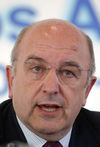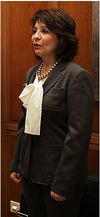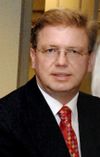Party of European Socialists
| Party of European Socialists Sozialdemokratische Partei Europas Parti socialiste européen Partito Socialista Europeo Partido socialista europeo Ευρωπαϊκό Σοσιαλιστικό Κόμμα (Evropaïkó Sosialistikó Kómma) Partia Europejskich Socjalistów Partido socialista europeu Avrupa Sosyalistleri Partisi De Europæiske Socialdemokrater Партия на европейските социалисти (Partiya na evropeyskite sotsialisti) Páirtí Sóisialach na hEorpa Strana evropských socialistů Partidul Socialiştilor Europeni |
|
|---|---|
 |
|
| President | Poul Nyrup Rasmussen MEP |
| Founded | 1953 (Group) 1973 (Confederation) 1992 (Party) |
| Headquarters | Rue du Trône/Troonlaan, 98, 1050 Brussels, Belgium |
| Youth wing | Ecosy |
| Ideology | Social democracy |
| International affiliation | Socialist International |
| European Parliament Group | Progressive Alliance of Socialists and Democrats |
| Official colours | Red |
| Website | |
| http://www.pes.org | |
| Politics of the European Union Political parties Elections |
|
The Party of European Socialists (PES) is a European political party led by Poul Nyrup Rasmussen MEP comprising social-democratic parties primarily from European Union member states, as well as other nations of the European continent. The PES member parties are themselves members of the Socialist International. The PES forms the majority of the Progressive Alliance of Socialists and Democrats (S&D) group in the European parliament. The PES also operates in the Committee of the Regions and the European Council.
Contents |
History
'60s
In 1961, the Socialists in the European Parliament attempted to produce a common European Socialist Programme but were neglected due to the applications of Britain, Denmark, Ireland and Norway to join the European Communities. The Socialist's 1962 congress pushed for greater democratisation and powers for Parliament though it was only in 1969 that this possibility was examined by the member states.
'70s
In 1973, Denmark, Ireland and the United Kingdom joined the European Community bringing in new parties from these countries. The enlarged Socialist Congress met in Bonn and inaugurated the Confederation of the Socialist Parties of the European Community. The Congress also passed a resolution on social policy, including the right to decent work, social security, democracy and equality in the European economy.[1] In 1978, the Confederation of Socialist Parties approved the first common European election Manifesto. It focused on several goals among which the most important were to ensure a right to decent work, fight pollution, end discrimination, protect the consumer and promote peace, human rights and civil liberties.
'80s
The Luxembourg Congress approved the first Statue of the Confederation of Socialist Parties in 1980. The accession of Greece in 1981, followed by Spain and Portugal in 1986 brought in more parties. In 1984 another common Socialist election manifesto was approved at a congress in Luxembourg. The Manifesto proposed a socialist remedy for the economic crisis by establishing a link between industrial production, protection of the fundamental social benefits and the fight for an improved quality of life.[1]
'90s
In 1992, with the European Communities becoming the European Union and with the Treaty of Maastricht establishing the framework for political parties at the European Level, the Confederation was able to mobilize a majority of delegates in favour of transforming the Confederation into the Party of European Socialists. The first programme of the party concentrated on job creation, democracy, gender equality, environmental and consumer protection, peace and security, regulation of immigration, discouragement of racism and fighting organised crime.[1]
'00s
In 2004 Poul Nyrup Rasmussen defeated Giuliano Amato to be elected President of the PES, succeeding Robin Cook in the post. He was re-elected for a further 2.5 years at the PES Congress in Porto on 8 December 2006 and for another 2.5 years at the Prague Congress in 2009.
'10s
Presidents
Presidents of the Party of European Socialists and its predecessors.[2]
| President | State | National party | Term | ||
|---|---|---|---|---|---|
| 1. | Wilhelm Dröscher | Social Democratic Party (SPD) | April 1974 | January 1979 | |
| 2. | Robert Pontillon | Socialist Party (PS) | January 1979 | March 1980 | |
| 3. | Joop den Uyl | Labour Party (PvdA) | March 1980 | May 1987 | |
| 4. | Vítor Constâncio | Socialist Party (PS) | May 1987 | January 1989 | |
| 5. | Guy Spitaels | Socialist Party (PS) | February 1989 | May 1992 | |
| 6. | Willy Claes | Socialist Party (SP) | November 1992 | October 1994 | |
| 7. | Rudolf Scharping | Social Democratic Party (SPD) | March 1995 | May 2001 | |
| 8. | Robin Cook | Labour Party | May 2001 | April 2004 | |
| 9. | Poul Nyrup Rasmussen | Social Democrats (SD) | April 2004 | - | |
Organisation
| Social democracy |
|---|
|
Precursors
Humanism
Age of Enlightenment French Revolution Utopian socialism Trade unionism Revolutions of 1848 Orthodox Marxism |
|
Development
Revisionism
Reformism Gradualism Frankfurt Declaration |
|
Policies
Representative democracy
Civil liberties Economic democracy Labor rights Mixed economy Nationalization Welfare state Fair trade Environmental protection Rhine Capitalism Secularism Social corporatism Social Market Economy |
|
Organizations
Social democratic parties
Socialist International International Union of Socialist Youth Party of European Socialists Young European Socialists International Trade
Union Confederation SAMAK |
|
Leaders
Social Democrats · Clement Attlee · Eduard Bernstein · Léon Blum · Hjalmar Branting · Ignacy Daszyński · Tommy Douglas · Friedrich Ebert · Michael Joseph Savage · Bülent Ecevit · Jean Jaurès · Karl Kautsky · Ferdinand Lassalle · Georgi Plekhanov · John Curtin ·
|
There are thirty-two member parties from all the twenty-seven member states and Norway. There are a further five associate and six observer parties. PES is an associated organisation of the Socialist International. Ecosy is the youth organisation of PES and PES Women is the party's women's organisation, led by Zita Gurmai MEP.[3]
The parties meet at the party Congress twice every five years to decide on political orientation, such as adopting manifestos ahead of elections. Every year that the Congress does not meet, the Council (a quarter Congress) shapes PES policy. The Congress also elects the party's President, Vice Presidents and the Presidency.[3]
The most recent Council was held in Madrid in December 2008 and the next Congress with be held in Prague in late 2009.
The President (currently former Danish Prime Minister Poul Nyrup Rasmussen) represents the party on a daily basis and chairs the Presidency, which also consists of the Secretary General, President of the PES group in Parliament (the PSE, see below) and one representative per full member party and organisation. They may also be joined by the President of the European Parliament (if a PES member), a PES European Commissioner and a representatives from associate parties and organisations.[3]
The Leader's Conference brings together Prime Ministers and Party Leaders from PES parties three to four times a year to agree strategies and resolutions.[3]
PES in the European institutions
Overview of the European institutions
| Organisation | Institution | Number of seats |
|---|---|---|
| European Parliament |
162 / 736
|
|
| European Commission |
6 / 27
|
|
| European Council (Heads of Government) |
5 / 27
|
|
| Council of the European Union (Participation in Government) |
9 / 27
|
|
| Parliamentary Assembly |
69 / 318
|
|
European Parliament
European Commission
European Commissioners are meant to remain independent, however there has been an increasing degree of politicisation within the Commission.[4] Although the current Barroso Commission is dominated by conservatives and liberals, six of the twenty-seven Commissioners belong to PES.
| Portfolio | Commissioner | State | Party | Photo |
|---|---|---|---|---|
| First Vice-President; Foreign Affairs and Security Policy |
Catherine Ashton |
United Kingdom |
Socialists National: Labour |
 |
| Vice-President; Competition |
Joaquín Almunia |
Spain |
Socialists National: PSOE |
 |
| Vice-President; Inter-Institutional Relations and Administration |
Maroš Šefčovič |
Slovakia |
Socialists National: Smer |
|
| Maritime Affairs and Fisheries | Maria Damanaki |
Greece |
Socialists National: ΠΑΣΟΚ |
 |
| Enlargement and European Neighbourhood Policy | Štefan Füle |
Czech Republic |
Socialists National: ČSSD |
 |
| Employment, Social Affairs and Inclusion | László Andor |
Hungary |
Socialists National: MSZP |
 |
European Council and Council of Ministers
.png)
Party-alignment at the European Council is often loose, but has been the basis of some intergovernmental cooperation. At present the following countries are led by a PES-affiliated leader, who represents that state at the European Council: Austria (Werner Faymann), Greece (George Papandreou), Portugal (José Sócrates), Slovenia (Borut Pahor) and Spain (José Luis Rodríguez Zapatero). The makeup of national delegations to the Council of Ministers is at some times subject to coalitions: for the above governments led by a PES party, that party may not be present in all Council configurations; in other governments led by non-PES parties a PES minister may be its representative for certain portfolios. PES is in coalition in a further three countries: Belgium, Luxembourg and the Netherlands.[6]
Overview
| State | Ruling party/coalition | Affiliated EU party/parties | Population |
Votes |
|---|---|---|---|---|
| Spanish Socialist Workers' Party | Party of European Socialists | 46,087,170 | 27 | |
| Christian Democratic Appeal Dutch Labour Party ChristianUnion[7] |
European People's Party Party of European Socialists Alliance of European Conservatives and Reformists |
16,576,800 | 13 | |
| Christian Democratic and Flemish Flemish Liberals and Democrats Reformist Movement Socialists Party Humanist Democratic Centre[7] |
European People's Party European Liberal Democrat and Reform Party Party of European Socialists |
10,827,519 | 12 | |
| Panhellenic Socialist Movement | Party of European Socialists | 11,125,179 | 12 | |
| Socialist Party | Party of European Socialists | 10,636,888 | 12 | |
| Austrian People's Party Social Democratic Party of Austria |
European People's Party Party of European Socialists |
8,372,930 | 10 | |
| Christian Social People's Party Luxembourg Socialist Workers' Party |
European People's Party Party of European Socialists |
502,207 | 4 | |
| Social Democrats For Real Democratic Party of Pensioners of Slovenia Liberal Democracy of Slovenia |
Party of European Socialists European Liberal Democrat and Reform Party |
2,054,119 | 4 |
Committee of the Regions
PES has 110 members in the Committee of the Regions as of 2007.[6]
Member parties
With 32 members it is the only political party to have a member from every EU state, although not all of them have elected MEPs.[8]
| State | Name (national language) | Name (English) | abbr. | MEPs |
|---|---|---|---|---|
| Sozialdemokratische Partei Österreichs | Social Democratic Party of Austria | SPÖ | 5 | |
| Socialistische Partij Anders | Socialist Party Different | SPa | 2 | |
| Parti Socialiste | Socialist Party | PS | 3 | |
| Българска социалистическа партия Bălgarska Socialističeska Partija |
Bulgarian Socialist Party | BSP | 5 | |
| Κίνημα Σοσιαλδημοκρατών Kínima Sosialdimokratón |
Movement for Social Democracy | EDEK | 1[9] | |
| Česká strana sociálně demokratická | Czech Social Democratic Party | ČSSD | 2 | |
| Socialdemokraterne | Social Democrats | SD | 5 | |
| Sotsiaaldemokraatlik Erakond | Social Democratic Party | SDE | 1 | |
| Suomen Sosialidemokraattinen Puolue | Social Democratic Party of Finland | SDP | 3 | |
| Parti Socialiste | Socialist Party | PS | 14 | |
| Sozialdemokratische Partei Deutschlands | Social Democratic Party of Germany | SPD | 24[10] | |
| Πανελλήνιο Σοσιαλιστικό Κίνημα Panellínio Sosialistikó Kínima |
Panhellenic Socialist Movement | PASOK | 8 | |
| Magyar Szocialista Párt | Hungarian Socialist Party | MSZP | 4 | |
| Magyarországi Szociáldemokrata Párt | Hungarian Social Democratic Party | MSZDP | 0 | |
| Páirtí an Lucht Oibre / Labour Party | Labour Party | PLO | 3 | |
| Partito Socialista Italiano | Italian Socialist Party | PSI | 4 | |
| Latvijas Sociāldemokrātiskā Strādnieku Partija | Social Democratic Workers' Party of Latvia | LSDSP | 0 | |
| Lietuvos Socialdemokratų Partija | Social Democratic Party of Lithuania | LSDP | 2 | |
| Lëtzebuerger Sozialistesch Arbechterpartei | Luxembourg Socialist Workers' Party | LSAP | 1 | |
| Partit Laburista | Labour Party | PL | 3 | |
| Partij van de Arbeid | Labour Party | PvdA | 3 | |
| Det norske Arbeiderparti | Norwegian Labour Party | DNA | N/A[11] | |
| Sojusz Lewicy Demokratycznej | Democratic Left Alliance | SLD | 5 | |
| Unia Pracy | Labour Union | UP | 0 | |
| Partido Socialista | Socialist Party | PS | 12 | |
| Partidul Social Democrat | Social Democratic Party | PSD | 10 | |
| Pàrtaidh Làbarach na h-Alba | Scottish Labour Party | PLA | 2 | |
| Smer – sociálna demokracia[12] | Direction - social democracy | Smer | 5 | |
| Socialni demokrati | Social Democrats | SD | 1 | |
| Partido Socialista Obrero Español | Spanish Socialist Workers' Party | PSOE | 24 | |
| Sveriges socialdemokratiska arbetareparti | Social Democratic Workers' Party of Sweden | SAP | 5 | |
| Llafur Cymru | Welsh Labour | LC | 1 | |
(Great Britain) |
Labour Party | Labour Party | LP | 19 |
(Northern Ireland) |
Páirtí Sóisialta Daonlathach an Lucht Oibre | Social Democratic and Labour Party | SDLP | 0 |
Associated parties
| State | Name (original language) | Name (English) | abbr. | Status |
|---|---|---|---|---|
| Partia Socialiste e Shqipërisë | Socialist Party | PSS | Associate | |
| Socijaldemokratska Partija BiH | Social Democratic Party | SDP | Associate | |
| Партия Български социалдемократи Partija Balgarski socialdemokrati |
Party of Bulgarian Social Democrats | PBS | Associate | |
| Socijaldemokratska Partija Hrvatske | Social Democratic Party of Croatia | SDP | Associate | |
| Samfylkingin | Social Democrat Alliance | S | Associate | |
| Социјалдемократски сојуз на Македонија Socijaldemokratski sojuz na Makedonija |
Social Democratic Union of Macedonia | SDSM | Associate | |
| Demokratska Partija Socijalista Crne Gore | Democratic Party of Socialists | DPS | Associate | |
| Socijaldemokratska Partija Crne Gore | Social Democratic Party | SDP | Associate | |
| Демократска странка Demokratska stranka |
Democratic Party | DS | Associate | |
| Sozialdemokratische Partei der Schweiz / Parti socialiste suisse |
Social Democratic Party of Switzerland | SP/PS | Associate | |
| Cumhuriyet Halk Partisi | Republican People's Party | CHP | Associate | |
| Barış ve Demokrasi Partisi | Peace and Democracy Party | BDP | Associate |
Observer parties
| State | Name (original language) | Name (English) | abbr. | Status |
|---|---|---|---|---|
| Partit Socialdemòcrata | Social Democratic Party | PS | Observer | |
| העבודה Ha'Avoda |
Labour Party | LP | Observer | |
| מרצ Meretz-Yachad |
Vitality - Together | MY | Observer | |
| Partito dei Socialisti e dei Democratici | Party of Socialists and Democrats | PSD | Observer | |
| Cumhuriyetçi Türk Partisi | Republican Turkish Party | CTP | Observer |
References
- ↑ 1.0 1.1 1.2 "History". Socialist Group website. http://www.socialistgroup.eu/gpes/history.do?lg=en. Retrieved 2007-11-11.
- ↑ "Former PES Presidents". PES website. http://www.pes.org/content/view/917. Retrieved 2008-01-21.
- ↑ 3.0 3.1 3.2 3.3 "How does PES work?". PES website. http://www.pes.org/content/view/42/69/lang,en/. Retrieved 2007-11-07.
- ↑ Mahony, Honor (2007-05-07). "Brussels struggles with communication policy.". EU Observer. http://euobserver.com/9/24016. Retrieved 2007-05-12.
- ↑ Does not account for coalitions. Image as of 8 July 2010. Key to colours is as follows; European People's Party Party of European Socialists European Liberal Democrat and Reform Party Independent Alliance of European Conservatives and Reformists Party of the European Left
- ↑ 6.0 6.1 "The Socialist Family in the EU". PES CoR Group website. http://www.cor.europa.eu/Pesweb/socialist.html. Retrieved 2007-11-07.
- ↑ 7.0 7.1 New government currently being formed in wake of recent elections. Government may change rapidly from June 2010
- ↑ "PES Members". PES website. http://www.pes.org/content/view/11/48/lang,en/. Retrieved 2007-11-07.
- ↑ Kyriacos Mavronicholas, since June 2009
- ↑ Bild.de, Linke Europa-Politikern tritt zur SPD über, 14. Mai 2009
- ↑ Norway is outside the European Union, hence this party does not participate in European elections.
- ↑ Membership suspended from 12 October 2006 until 14 February 2008 due to Smer's coalition with the Slovenská národná strana.
External links
- Party of European Socialists, official website
- Parliamentary Group of the Party of European Socialists, official website
- 2009 Manifesto consultation, PES website
- PES Manifesto, PES blog
- PES Group in the Committee of the Regions, official website
|
|||||||||||||||||||||||||||||||||||
|
|||||||||||||||||||